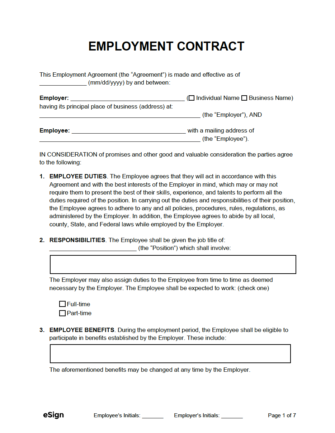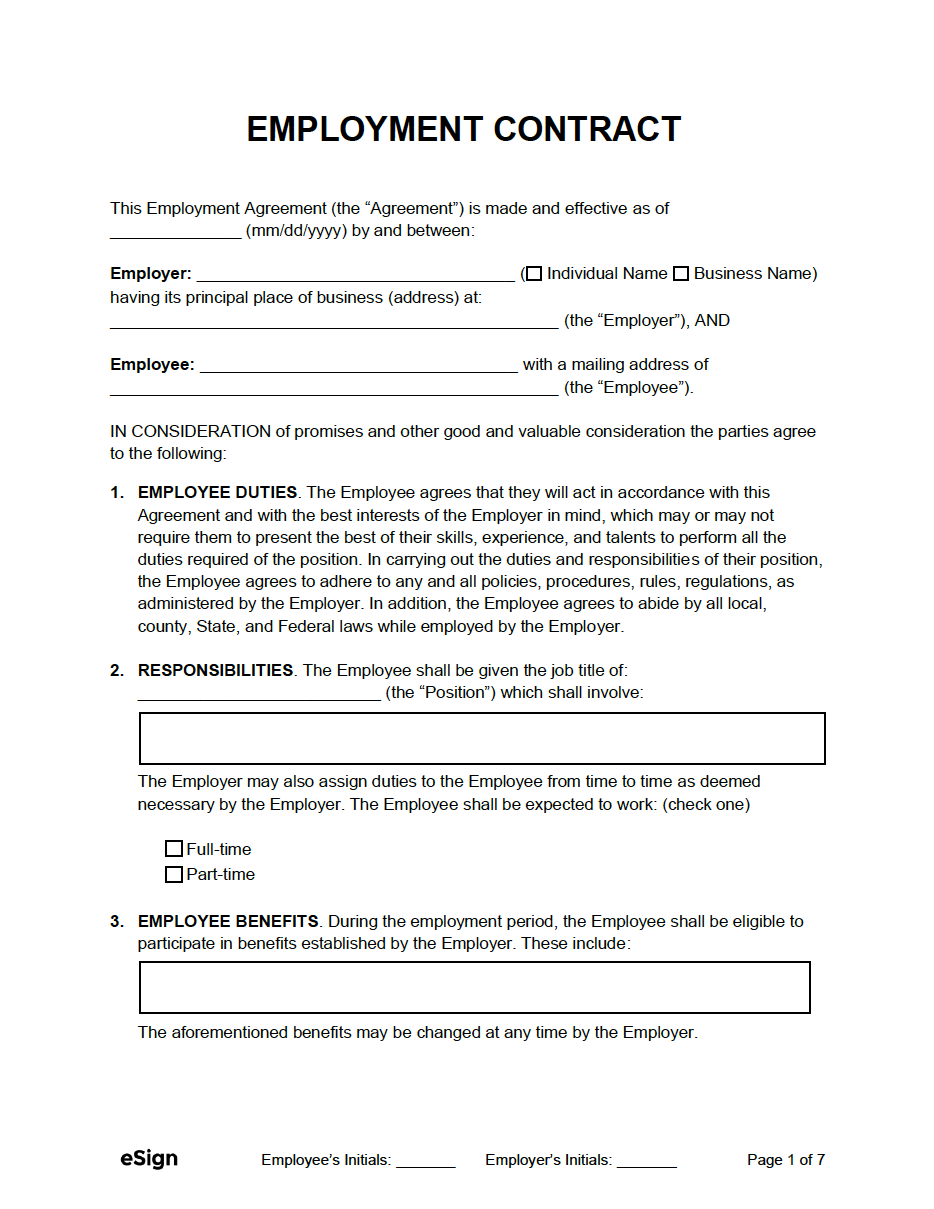By State
- Alabama
- Alaska
- Arizona
- Arkansas
- California
- Colorado
- Connecticut
- Delaware
- Florida
- Georgia
- Hawaii
- Idaho
- Illinois
- Indiana
- Iowa
- Kansas
- Kentucky
- Louisiana
- Maine
- Maryland
- Massachusetts
- Michigan
- Minnesota
- Mississippi
- Missouri
- Montana
- Nebraska
- Nevada
- New Hampshire
- New Jersey
- New Mexico
- New York
- North Carolina
- North Dakota
- Ohio
- Oklahoma
- Oregon
- Pennsylvania
- Rhode Island
- South Carolina
- South Dakota
- Tennessee
- Texas
- Utah
- Vermont
- Virginia
- Washington
- West Virginia
- Wisconsin
- Wyoming
By Type (4)
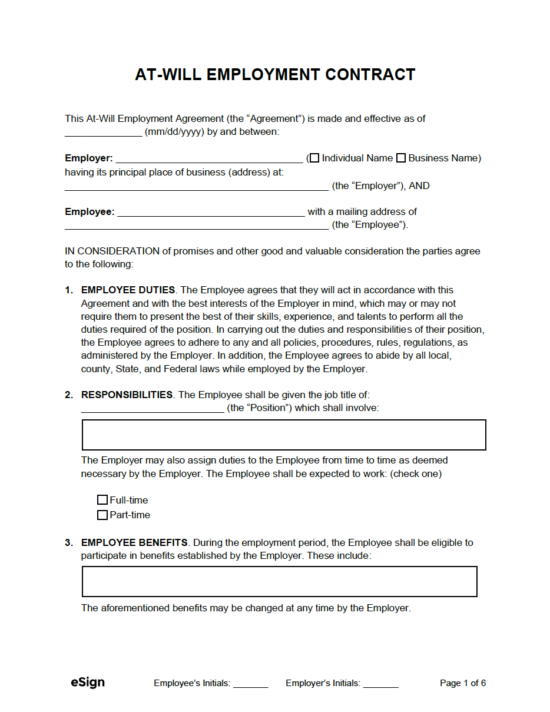 At-Will Employment Contract – Has no fixed duration and can be terminated by either party at any time, for any lawful reason or for no reason at all. At-Will Employment Contract – Has no fixed duration and can be terminated by either party at any time, for any lawful reason or for no reason at all.
|
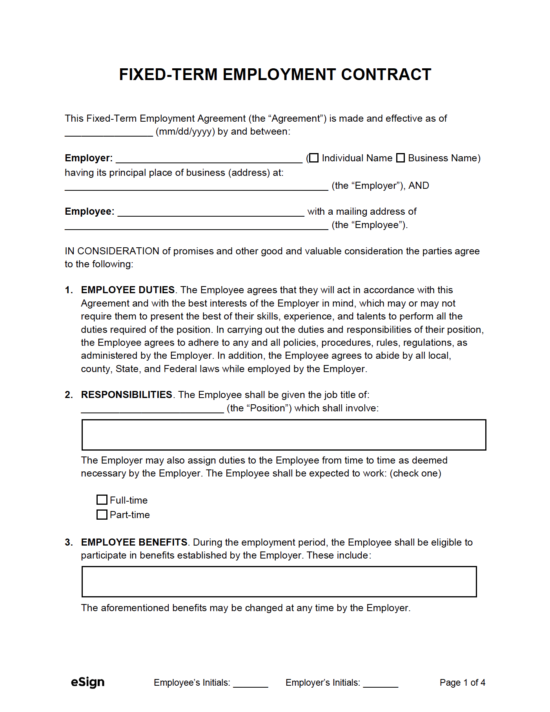 Fixed-Term Employment Contract – Hires an employee for a fixed period and only terminates under the agreed contract terms. Fixed-Term Employment Contract – Hires an employee for a fixed period and only terminates under the agreed contract terms.
|
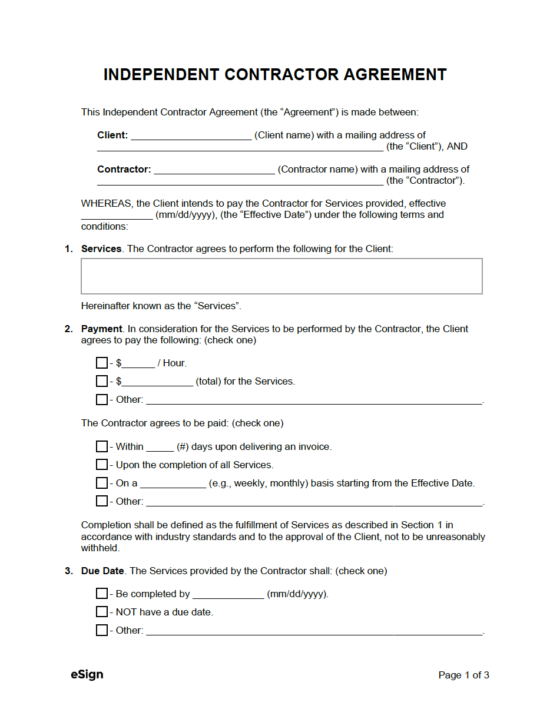 Independent Contractor Agreement – Lays out the conditions under which a business or self-employed worker provides services to a client. Independent Contractor Agreement – Lays out the conditions under which a business or self-employed worker provides services to a client.
|
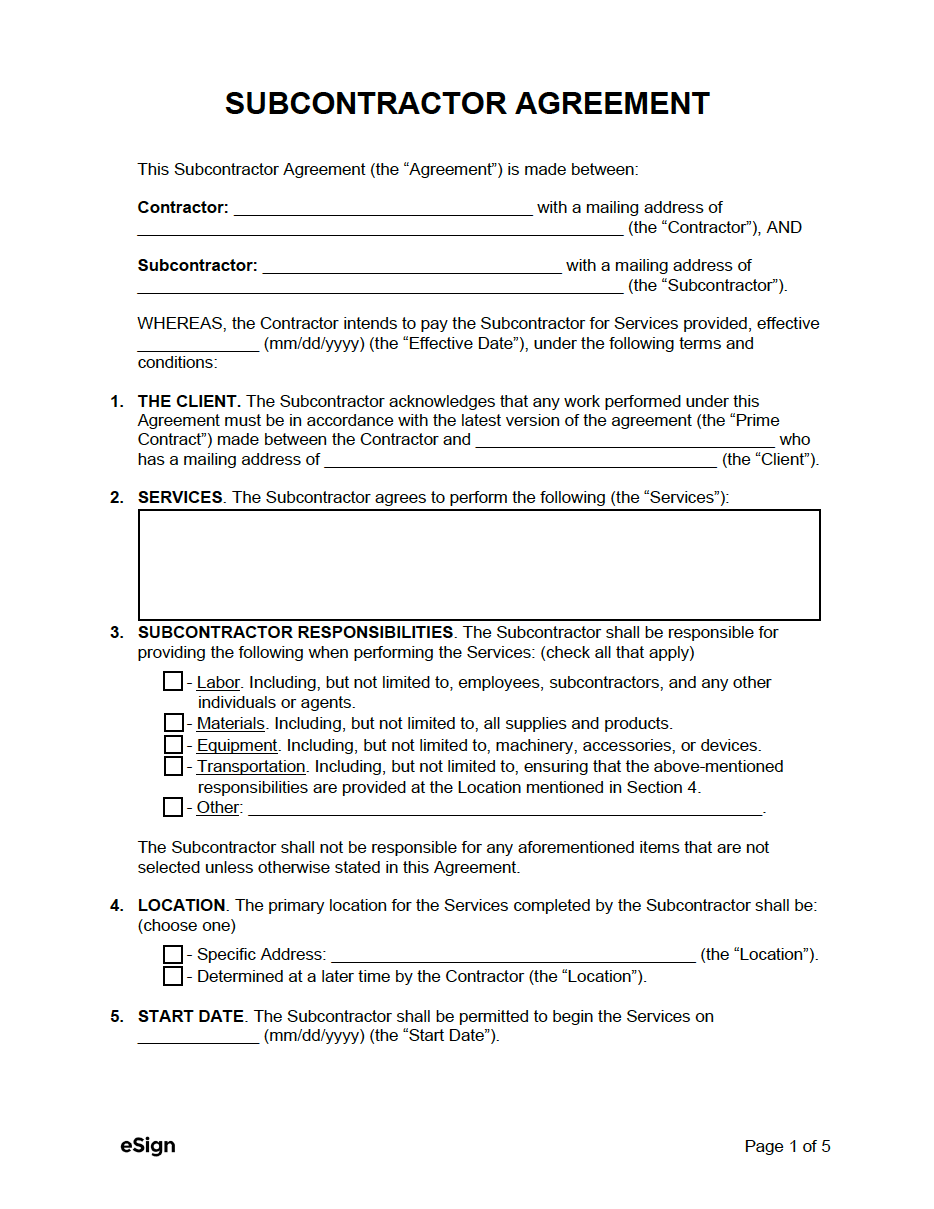 Subcontractor Agreement – Forms a working arrangement between a contractor and a subcontractor hired to complete part of a larger project. Subcontractor Agreement – Forms a working arrangement between a contractor and a subcontractor hired to complete part of a larger project.
|
Addendums / Supplemental Forms (5)
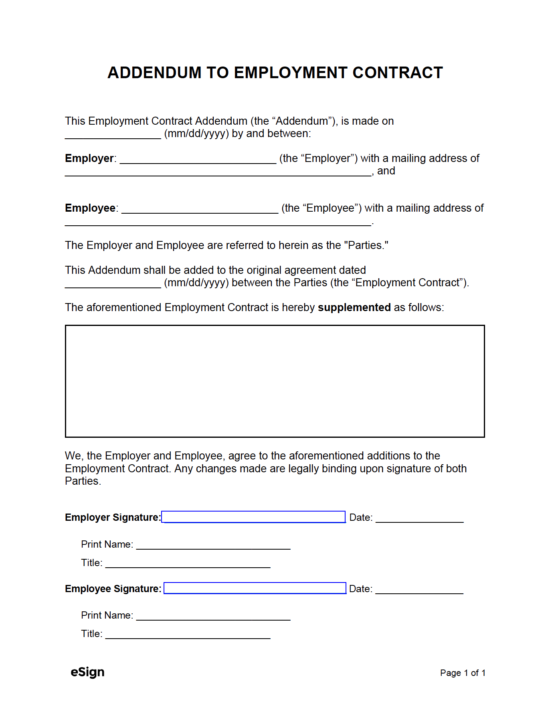 Employment Contract Addendum – Adds additional terms to an existing employment contract without changing its core provisions. Employment Contract Addendum – Adds additional terms to an existing employment contract without changing its core provisions.
|
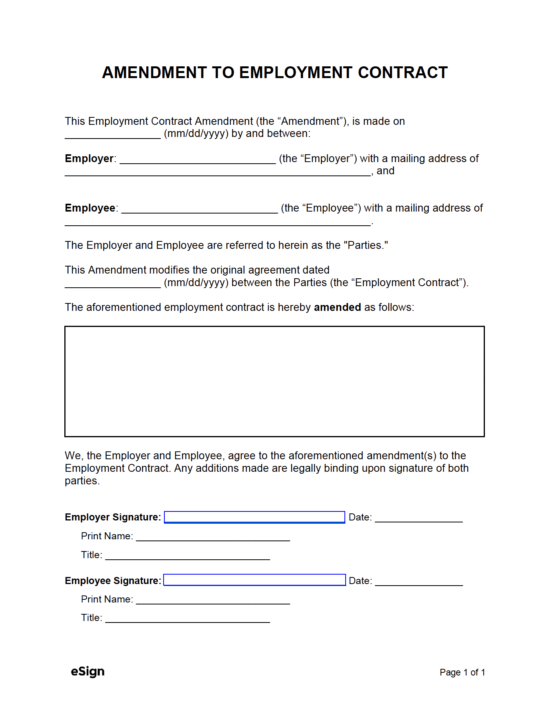 Employment Contract Amendment – Allows the parties to update or delete specific information in an employment contract. Employment Contract Amendment – Allows the parties to update or delete specific information in an employment contract.
|
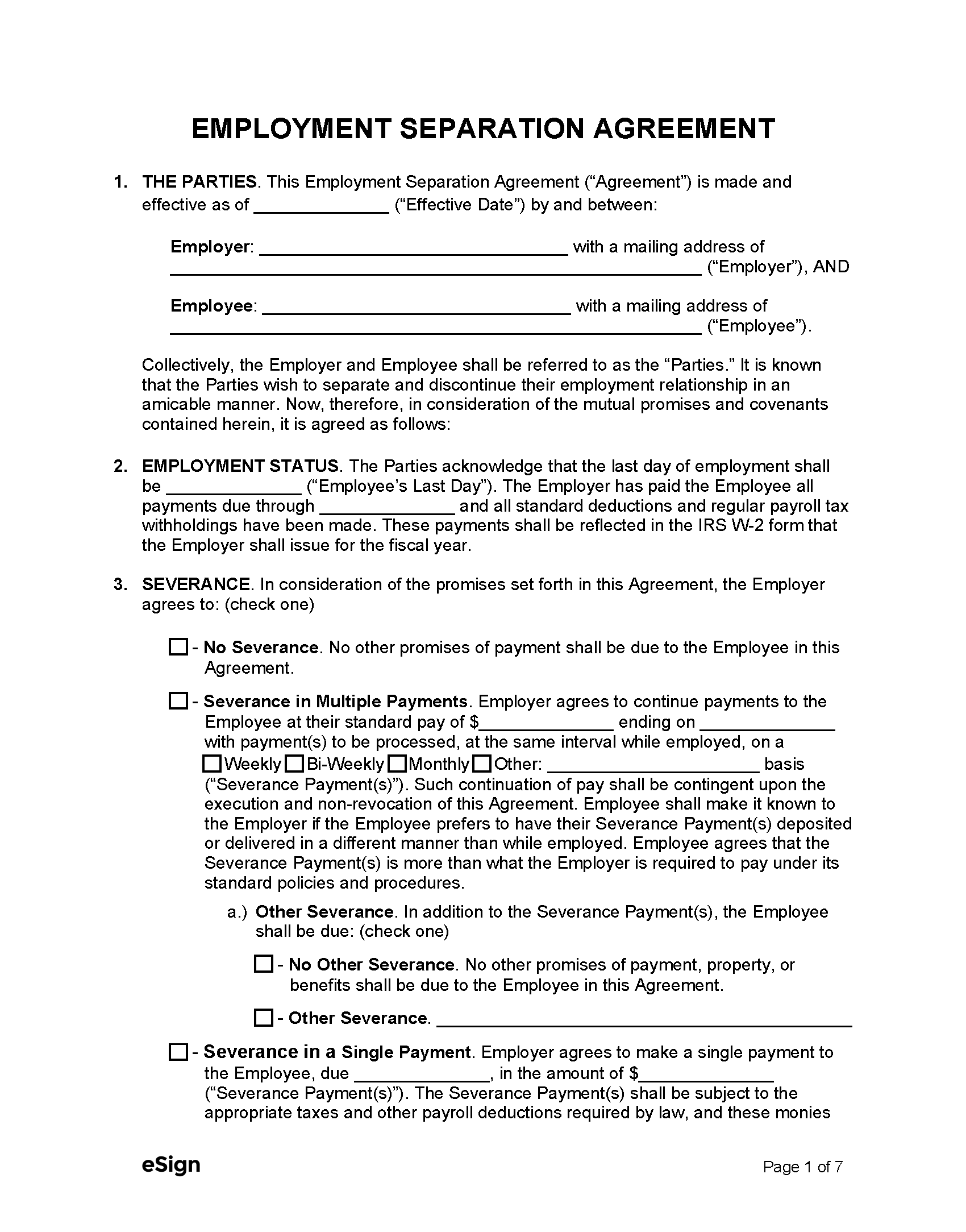 Employment Separation Agreement – Outlines the terms of an employee’s termination, including severance and waiver of claims. Employment Separation Agreement – Outlines the terms of an employee’s termination, including severance and waiver of claims.
|
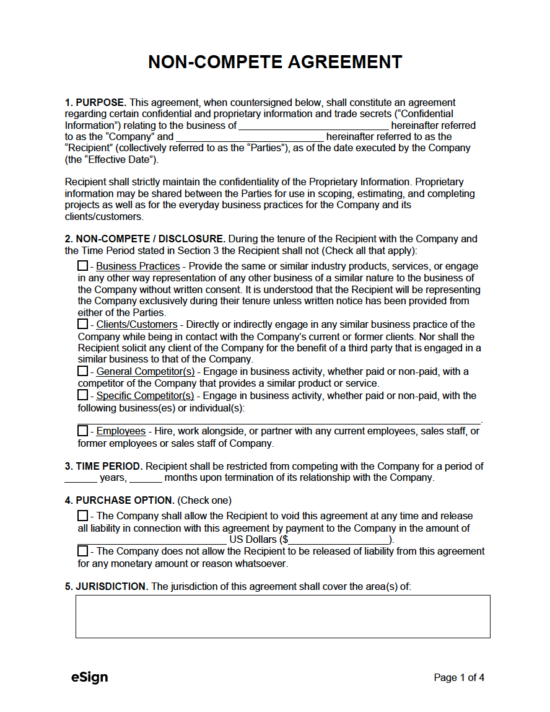 Non-Compete Agreement – Prevents workers from competing within the same industry during and following their employment. Non-Compete Agreement – Prevents workers from competing within the same industry during and following their employment.
|
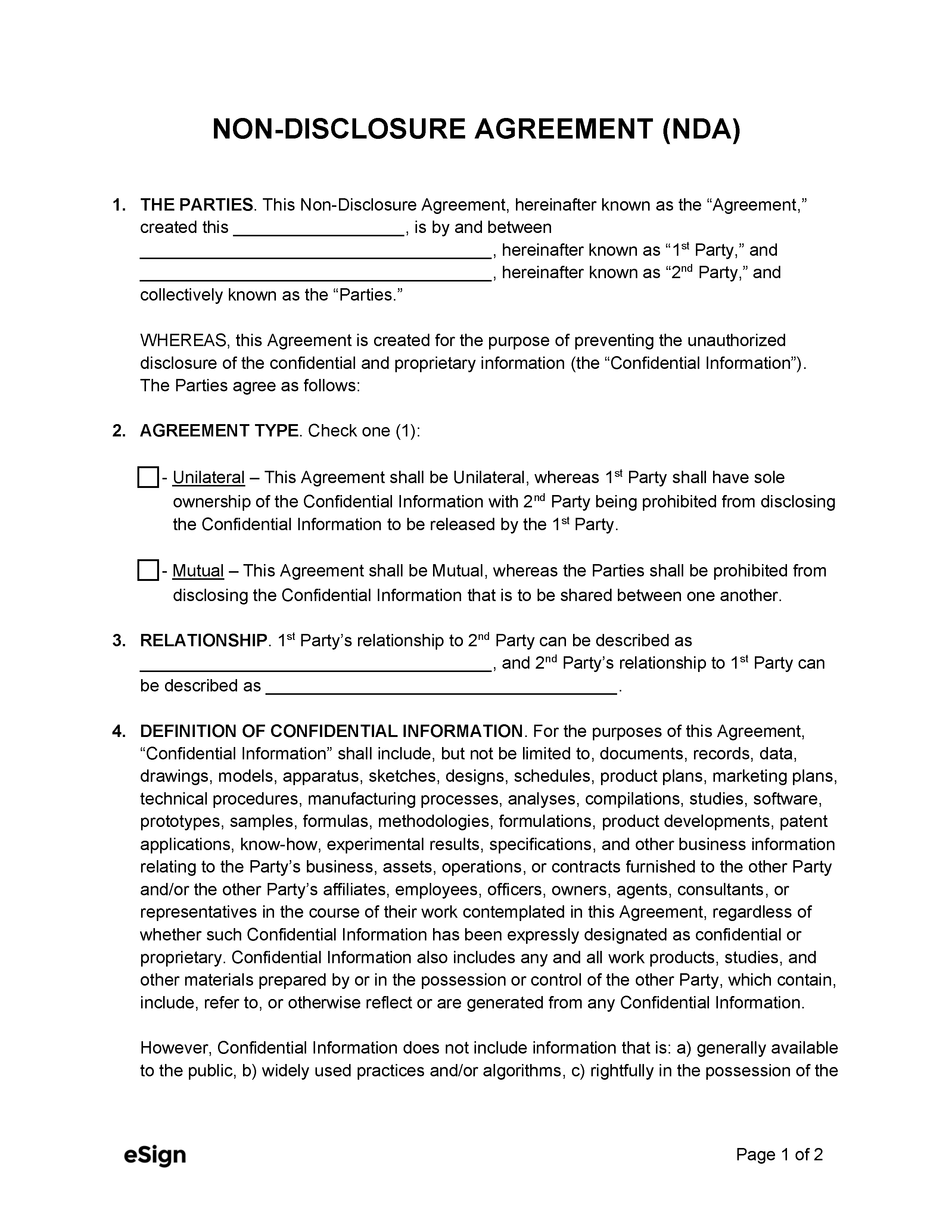 Non-Disclosure Agreement – Restricts an employee or contractor from sharing a company’s proprietary information with third parties. Non-Disclosure Agreement – Restricts an employee or contractor from sharing a company’s proprietary information with third parties.
|
What’s Covered in the Contract
- Payment (salary, commissions, bonuses)
- Employee rules and responsibilities
- Length of employment (the “term”)
- Dispute resolution
- Benefits (e.g., insurance, PTO, holidays)
- Grounds for termination
- Non-disclosure/confidentiality
What is a Contract of Employment?
An employment contract is a binding agreement that sets out the terms of an employer-employee relationship. It puts into writing each party’s role, rights, and obligations, helping to prevent disagreements and misunderstandings. If either party fails to uphold the terms, the other can rely on the contract to protect their rights.
Once signed, an employment contract can only be changed by mutual written consent. This lack of flexibility means that these contracts are usually reserved for executive positions, tenured professors, or government/union workers.
Note on At-Will Employees
In the United States, most employees are considered at-will, meaning either the employer or the employee may end the working relationship at any time and for almost any reason.
An employment relationship becomes contract-based (instead of at-will) when the agreement guarantees employment for a set period or limits termination to specific reasons, such as a breach of confidentiality.
Employment Contract vs Offer Letter
Employment Contract
- Signed after an employee officially accepts a position
- Sets detailed terms of employment, including each party’s rights and obligations
- Legally binding
Offer Letter
- Provided to candidates before a position is accepted
- Summarizes basic job offer details such as title, pay, hours, start date, and benefits
- Usually not legally binding
Sample
Employer: [EMPLOYER NAME], having its principal place of business at [EMPLOYER ADDRESS] (“Employer”), AND
Employee: [EMPLOYEE NAME], with a mailing address of [EMPLOYEE ADDRESS] (“Employee”).
IN CONSIDERATION of promises and other good and valuable consideration, the parties agree to the following:
1. EMPLOYEE DUTIES. The Employee shall be given the job title of [POSITION] (“Position”), which is a ☐ full-time ☐ part-time position that shall involve: [DESCRIBE DUTIES].
2. EMPLOYEE BENEFITS. During employment, the Employee shall be eligible to participate in benefits established by the Employer. These benefits include: [DESCRIBE BENEFITS].
3. EMPLOYMENT PERIOD. The Employer agrees to hire the Employee: (check one)
☐ – At-Will, which means either party may terminate this Agreement at any time.
☐ – For a Specified Time Period, beginning on [DATE] and ending on [DATE].
4. TERMINATION. Either party shall have the right to terminate this Agreement by providing at least [#] days’ written notice to the other.
5. PAY. As compensation for the services provided, the Employee shall be paid $[PAY] ☐ per hour ☐ salary on an annual basis (“Compensation”). The Compensation is a gross amount subject to all local, state, federal, and other taxes and deductions as prescribed by law. Payment shall be distributed on a [FREQUENCY] basis.
6. TRIAL PERIOD. Other than certain benefits prescribed by law, the Employee will not be eligible for benefits, vacation time, or personal leave until after the first [#] days of employment (“Trial Period”).
7. VACATION TIME. After the Trial Period is complete, the Employee is entitled to [#] days off per year. The Employee must give notice before scheduling their vacation. Any unused vacation time shall be: [DESCRIBE (E.G., CONVERTED TO CASH, FORFEITED)].
8. PERSONAL LEAVE. After the Trial Period, the Employee shall be eligible for [#] days of ☐ paid ☐ unpaid time off per year for personal or medical issues. Any unused personal leave shall be: [DESCRIBE (E.G., CONVERTED TO CASH, FORFEITED)].
If, for any reason, the Employee depletes their allotted number of days of personal leave in a given year, the Employee ☐ MAY ☐ MAY NOT be able to use any remaining vacation time.
9. FEDERAL HOLIDAYS. The Employee shall be entitled to [#] federal holidays per calendar year, as designated by the Employer and subject to change annually. If the Employee requests a federal holiday off, the Employer may decide whether the absence is permitted and whether it will be charged to personal leave or vacation time.
10. CONFIDENTIALITY. The Employee agrees to keep the Employer’s proprietary information strictly confidential, including but not limited to business plans, products, services, processes, trade secrets, intellectual property, customer data, pricing, and financial information. Any direct or indirect disclosure of confidential information may result in litigation, equitable relief, and recovery of losses, damages, and attorney’s fees.
This obligation shall continue for [#] months after employment ends, subject to the maximum period allowed by applicable law.
11. COMPLIANCE. The Employee agrees to act in the Employer’s best interests, follow all company rules and regulations, and comply with all applicable local, state, and federal laws throughout their employment.
12. AMENDMENTS. This Agreement may be modified or amended if any such amendment is attached and authorized by all parties.
13. SEVERABILITY. If any part of this Agreement is found unenforceable or invalid, the remaining provisions shall remain binding. Any affected provision will still be enforced to the maximum extent permitted by law.
14. WAIVER OF CONTRACTUAL RIGHT. If the Employer or Employee fails to enforce a provision or section of this Agreement, it shall not be determined as a waiver or limitation. Either party shall retain the right to enforce and compel the compliance of this Agreement to its fullest extent.
15. GOVERNING LAW. This Agreement shall be governed under the laws of the State of [STATE].
16. ENTIRE AGREEMENT. This Agreement, along with any attachments or addendums, represents the entire agreement between the parties. Therefore, this Agreement supersedes any prior agreements, promises, conditions, or understandings between the Employer and Employee.
17. SIGNATURES. IN WITNESS WHEREOF, this Agreement was signed by the parties under the hands of their duly authorized officers and made effective as of the undersigned date.
Employer Signature: ____________________ Date: [MM/DD/YYYY]
Print Name: [PRINTED NAME]
Employee Signature: ____________________ Date: [MM/DD/YYYY]
Print Name: [PRINTED NAME]
